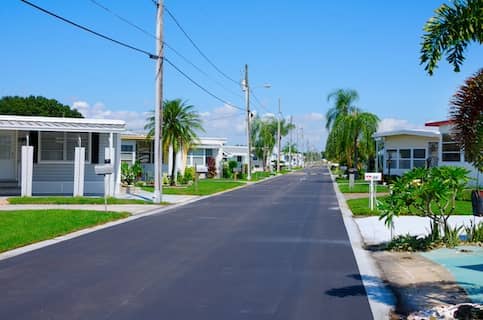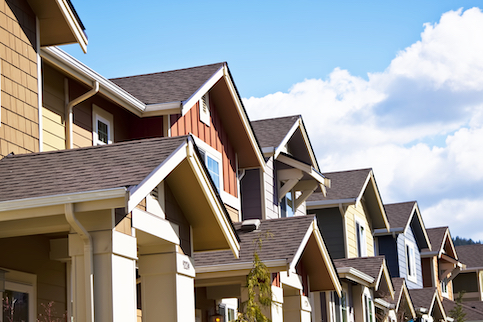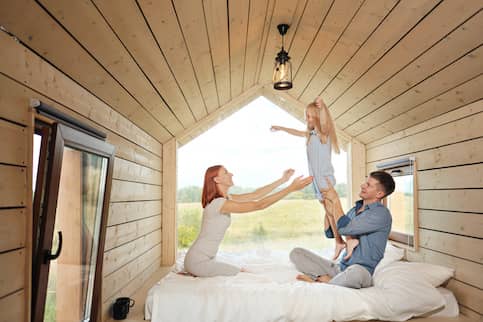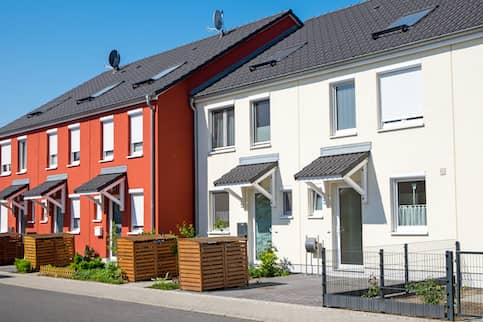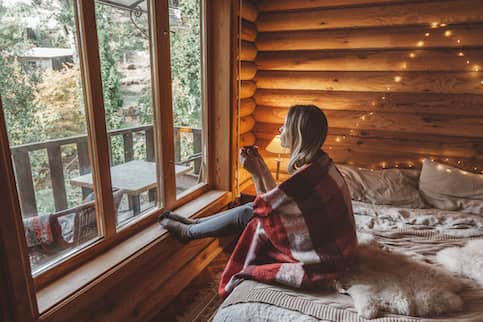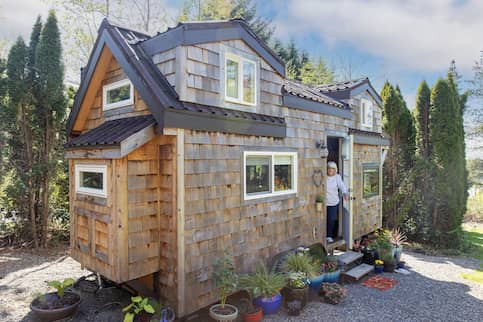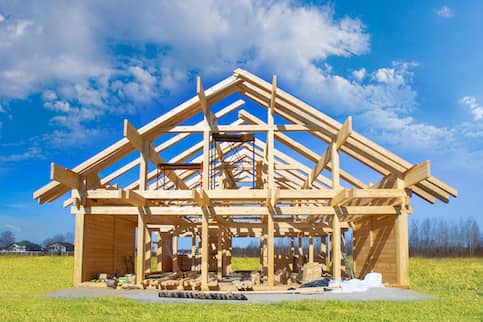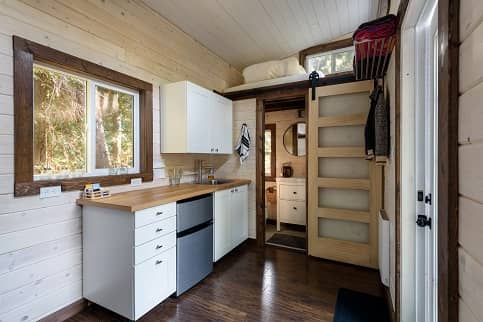Everything You Need To Know About Energy-Efficient Homes
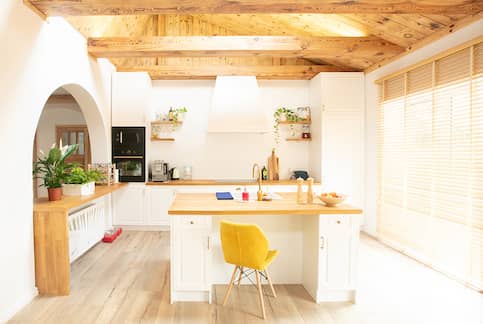
Energy-efficient homes are increasing in popularity as homeowners become more interested in sustainability and living environmentally friendly lifestyles. Whether you’re looking to build from the ground up, remodel a house or buy a home that’s already energy-efficient, some key design elements are essential for any truly green home.
Let’s look at some of them.
What Is An Energy-Efficient Home?
An energy-efficient home is a property designed to use less energy while still providing the same level of protection, comfort, convenience and aesthetic appeal as a more traditional house.
A simple example of energy efficiency in your home would be switching out your traditional light bulbs for compact fluorescent bulbs or light-emitting diode (LED) bulbs. While both bulbs produce light, the compact fluorescent and LED bulbs do so using less energy.
See What You Qualify For
Home Purchase
Home Refinance
Tap Into Equity
How Energy-Efficient Houses Are Built
Energy-efficient homes are built with sustainable materials designed to minimize the home’s impact on the environment. Below are a few key steps that contractors take to ensure that new homes are as energy-efficient as possible.
1. Pick The Right Building Materials
Choosing to use more sustainable building materials, such as reclaimed wood or natural stone, in the construction of a home is one way builders can be more energy-efficient in their design choices.
Additionally, some building materials can increase a home’s efficiency, including:
- Recycled steel
- Non-fiberglass spray foam insulation
- Concrete
- Bamboo
2. Use Proper Insulation
Proper insulation helps keep your home warm in the winter and cool in the summer without making your heating or air conditioning system work overtime to regulate the temperature. When building energy-efficient homes, contractors will install enough insulation in the attic space, walls and floor to keep the home cool in the summer and warm in the winter.
They’ll also install double- or triple-pane windows to give the home plenty of natural light without compromising the level of insulation in the walls.
3. Install Efficient Appliances And Fixtures
Standard appliances could be the culprit behind high energy bills, but that’s where energy-efficient appliances come in. Energy Star appliances not only offer savings on energy bills, but since 1992, they’ve also contributed to a 4 billion metric ton reduction in greenhouse gas emissions often caused by products with inefficient energy use.
When designing and building energy-efficient homes, contractors often install Energy Star appliances as part of the build.
Additionally, many builders are making the switch to eco-friendly systems like LED bulbs or low-flow fixtures and toilets, whichcan also save homeowners major money.
4. Integrate ‘Smart Home’ Systems
Smart home upgrades not only make a house more automated, but they can also save homeowners money on energy bills. Some popular upgrades that builders often incorporate into their designs include:
- Home hubs
- Smart lighting systems
- Energy meters
- Smart thermostats
- Smart security systems
Many smart home devices learn your habits and preferences and can suggest changes in your energy use based on your needs and how much money you want to save.
5. Harness Solar Power
Builders place windows strategically to take advantage of the sun’s natural heat. With plenty of south-facing windows, you canheat your home more efficiently in winter. In summer, covering the windows will keep the house cool.
Some contractors also prepare the house for solar installation during the building process. This makes it easier for homeowners to install panels once they’re in the home.
Although an expensive addition, solar panels have a high return on investment (ROI) and can save you money on energy use, depending on your location. Some electric companies may even pay you for additional energy that your solar panels produce.
However, solar panels might affect your mortgage, so make sure you speak with your lender before installing solar panels in your home.
6. Get A LEED Certification
In some cases, homes will feature LEED certification as a key selling point for energy efficiency. A home with LEED certification meets specific environmental standards established by the U.S. Green Building Council (USGBC).
Contractors often follow the guidelines set by the USGBC to help them plan their designs for maximum efficiency.
7. Build For The Location And Climate
Before starting a building project, contractors generally make sure they know the specific energy concerns of the locale. If they’re building in a temperate climate, for example, they might not need to put as much effort into insulating the home. More effective ways might be available to use that money to achieve greater efficiency in the long run.
See What You Qualify For
You can get a real, customizable mortgage solution based on your unique financial situation.
How To Make Your Current Home More Energy-Efficient
Not ready to buy or build a new, energy-efficient house? You have plenty of ways to make your current home more energy-efficient and save money in the long run.
Get An Energy Assessment Or Audit
The U.S. Department of Energy can provide you with recommendations for energy assessors in your area. Considering factors like the home’s structure and the heating, cooling and hot water systems, the Department of Energy will assign a Home Energy Score that determines the efficiency of the home and makes recommendations for how to improve your home’s energy efficiency.
The U.S. Environmental Protection Agency (EPA)’s Energy Star program can also perform energy audits on your home to determine what you should upgrade. Home audits typically vary in price, ranging from free to $500, depending on your location and service provider.
Adjust Your Thermostat
Adopt the habit of adjusting the temperature on your thermostat, especially while sleeping or away from home. Dropping the temp by just 3 – 5 degrees can reduce your energy use and lower your monthly utility bills in the winter. According to Energy.gov, lowering your thermostat 7 – 10 degrees for 8 hours a day during the coldest months can save you as much as 10% a year on your heating bills. Conversely, raising your thermostat in the summer can save you money on central air conditioning.
Limit Space Heater Use
Although electric and gas space heaters keep your feet nice and toasty under the desk during cooler weather, they aren’t the most efficient way to heat your home. Many space heaters require 1,500 watts of energy to run and can cause a spike in the cost of your energy bill.
If you choose to use a space heater, look for one that uses fewer watts, only use the heater when you’re in the room and wear layers to help you stay warm even if the room is a bit on the chilly side.
Make Smart Water Choices
According to the EPA, the average household can save about $380 and more than 2,700 gallons of water a year by installing EPA-approved WaterSense showerheads and other fixtures.
If you’re not ready to make the investment, you can still save water each day. Here are a few more water-saving hacks:
- Use low-flow showerheads to halve your shower water consumption. These showerheads can increase your water pressure while decreasing your water use.
- Turn off the water while brushing your teeth so nothing goes to waste.
- Avoid running small loads of laundry and instead do fewer, larger loads.
- Get your plumbing inspected regularly and repair any leaks or dripping faucets as soon as possible.
Landscape Carefully
Believe it or not, the right plants can help you make your home more efficient while also improving your property value. If possible, plant shade trees near your home. They’ll shade the sides of your house once they grow tall enough, providing a cooler space even when the temps are high. Also, consider adding native flowers and plants to your garden beds since these will be better equipped to grow in your climate without you needing to water them too often.
If you have space in your backyard, start a compost pile. Compost is the result of organic waste, like vegetable trimmings and fruit, kept in a pile or container that decomposes over time. Your fruit and vegetable waste not only becomes valuable fertilizer for your lawn or garden, but it also reduces the amount of trash you produce on a daily basis.
Is An Energy-Efficient Home Worth It?
Should you bring more energy efficiency to your home? If you can afford it, the answer is, simply, yes.
Let’s discover why the benefits of energy efficiency outweigh the drawbacks.
Benefits Of Having An Energy-Efficient House
Energy efficiency boasts more benefits than just better-burning light bulbs, including:
- Saving money on utility bills
- Providing tax rebates (depending on your state)
- Minimizing your carbon footprint
- Boosting the economy
- Increasing your quality of life
Due to the growing popularity of energy-efficient homes, incorporating energy-efficient features in your home can increase its market value. In fact, a Freddie Mac study indicates that homes rated as more energy efficient tend to sell for 3% – 5% more than less efficient homes.
The Downside Of An Energy-Efficient House
The only downside of an energy-efficient home is the upfront cost. Whether you’re purchasing a newly built home or converting your preexisting home, energy-efficient features don’t come cheap.
For already-built homes, the cost to upgrade to energy-efficient features can reach into the thousands. With newly built homes, contractors will have to pass on the extra cost of any Energy Star appliances, higher-quality insulation or sustainable materials used in the home, which can increase the average cost to build a new house significantly.
However, the savings you can expect from having energy-efficient features in your home can eventually outweigh the cost of installing those features.
The Bottom Line: An Energy-Efficient Home Can Be A Win-Win
Whether you’re building a new home or looking to upgrade your current house, investing in energy-efficient improvements can have real value. Not only will you reduce your home energy use, but you’ll likely also save money on your utility bills each month.
Ready to start looking for an energy-efficient home? Apply online today to see your mortgage options and start searching for the green home of your dreams. You can also give us a call at (833) 230-4553.
Protect what’s precious
Find the best home security system for you.
